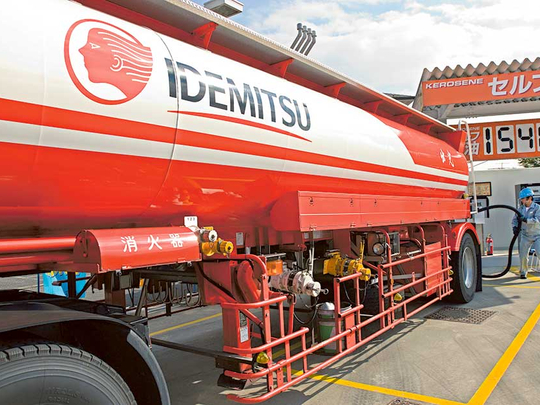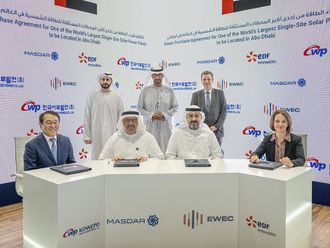
Tokyo: The conflict between Middle East oil suppliers Iran and Saudi Arabia is playing out between the founding family of one of Japan’s largest refiners and its board.
Idemitsu Kosan Co agreed last July to buy a stake with 33.3 per cent voting rights in Showa Shell Sekiyu KK from Royal Dutch Shell Plc for 169 billion yen (Dh6 billion, $1.64 billion). Idemitsu has close ties with Iran and shouldn’t be associated with Showa Shell, in which state-run Saudi Arabian Oil Co owns a stake, said a lawyer for Idemitsu’s founding family, which “wants the company to let go of the stake”.
Tensions between two of the world’s biggest oil producers have risen in the Middle East as both seek regional influence and compete for customers globally. The public disagreement between the Idemitsu family and the company’s board comes as Japan has revamped its rules for companies and investors placing more emphasis on independent directors and their duties to shareholders.
“We are not saying Idemitsu should only deal with Iran,” Takujiro Hamada, 74, a lawyer for the Idemitsu family, said in an interview in Tokyo on June 30. “It’s uncertain how relations in the Middle East will develop after Saudi Arabia ended diplomatic relations with Iran. Merging with Showa Shell, which is an affiliated company of the Saudis, is similar to setting foot in a minefield.”
Idemitsu was the biggest loser on the MSCI AC Asia Pacific Index, dropping 5.5 per cent to close at 2,091 yen, the lowest since April 18. Showa Shell slid 1.7 per cent. The broader Topix index gained 0.7 per cent.
Shareholder opposition
This isn’t the first time founders and their descendants of Japanese companies have spoken out against management decisions. Seven & i Holdings Co Chairman and Chief Executive Officer Toshifumi Suzuki stepped down in May after Masatoshi Ito, a founder of its unit Ito-Yokado Co, rejected Suzuki’s plan on his successor. Akimitsu Sano, the founder of Cookpad Inc and owner of 44 per cent in the company, shocked investors in January by calling on them to dump all other directors, saying the company was neglecting its main business.
About 47 per cent of shareholders voted against the reappointment of Idemitsu President Takashi Tsukioka, according to a company filing June 30. The founding family controls about 34 per cent of shares in Idemitsu, and Hamada said it voted against the reappointment of all directors.
Hamada is one of three representative directors along with descendants of Idemitsu’s founder in Nissho Kosan KK, the biggest shareholder of Idemitsu with a 16.95 per cent stake. The Idemitsu family controls 34 per cent of Idemitsu and they may be able to block the deal, which needs more than two-thirds of votes at a special shareholder meeting.
Nissho Maru
Saudi Arabia’s state-owned Saudi Arabian Oil Co owns a 14.96 per cent stake in Showa Shell, according to data compiled by Bloomberg.
“A merger is the only way that Idemitsu’s management has decided to push ahead to survive in the years ahead,” Yasuhide Yajima, chief economist at NLI Research Institute, said by phone. “In a bid to get a merger deal with Showa Shell done, Idemitsu’s management needs swiftly to embark on real talks with the founding family that is the largest shareholder. Dialogue is the only way left if Idemitsu determines to take a peaceful approach on this.”
Idemitsu will continue to communicate with the founding family, a spokesman for the company said by phone, asking not to be identified because of internal policy. He declined to comment further.
The Japanese refiner has maintained a close relationship with Iran since the so-called Nissho Maru Incident in 1953. At the time Idemitsu sent tanker Nissho Maru to load gasoline and diesel oil amid a conflict between Iran and the UK after the Middle East country nationalised the oil industry.












